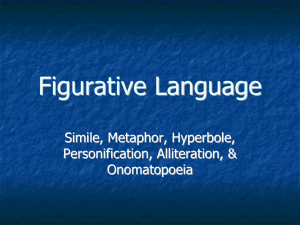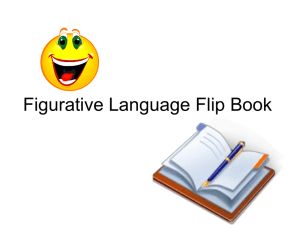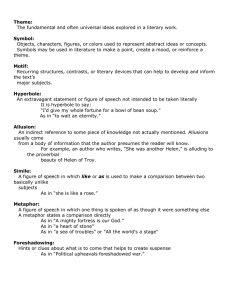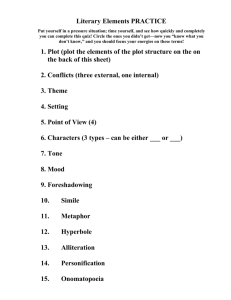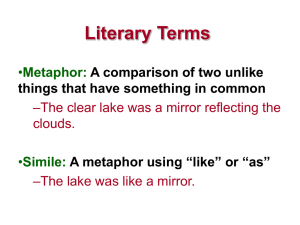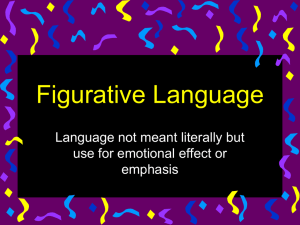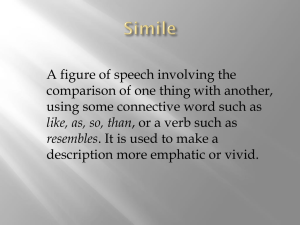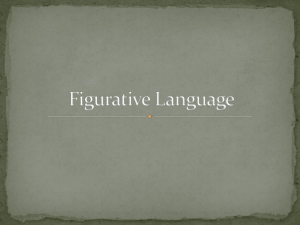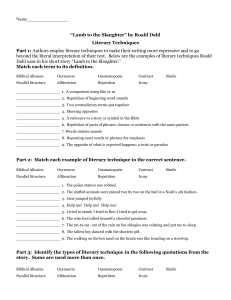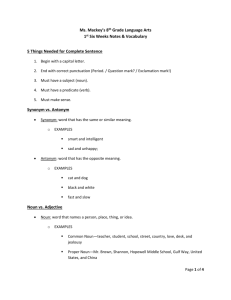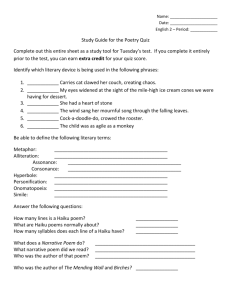Name: PARTS OF SPEECH LITERARY ELEMENTS EXAM I. Parts of
advertisement
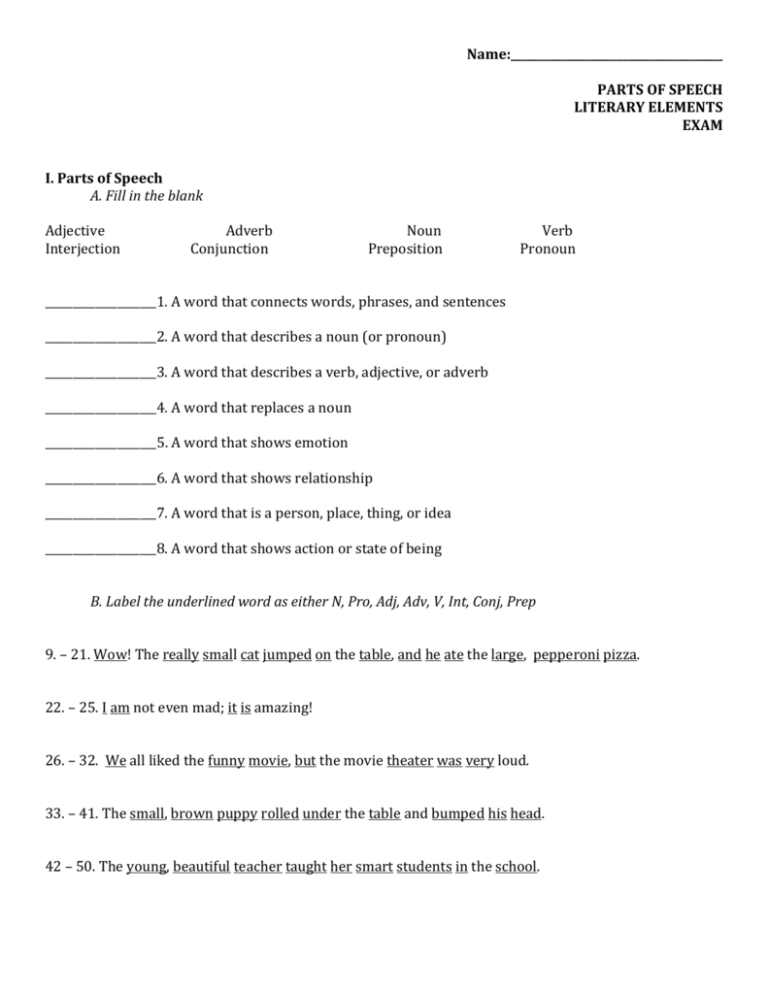
Name:______________________________________ PARTS OF SPEECH LITERARY ELEMENTS EXAM I. Parts of Speech A. Fill in the blank Adjective Interjection Adverb Conjunction Noun Preposition Verb Pronoun ____________________1. A word that connects words, phrases, and sentences ____________________2. A word that describes a noun (or pronoun) ____________________3. A word that describes a verb, adjective, or adverb ____________________4. A word that replaces a noun ____________________5. A word that shows emotion ____________________6. A word that shows relationship ____________________7. A word that is a person, place, thing, or idea ____________________8. A word that shows action or state of being B. Label the underlined word as either N, Pro, Adj, Adv, V, Int, Conj, Prep 9. – 21. Wow! The really small cat jumped on the table, and he ate the large, pepperoni pizza. 22. – 25. I am not even mad; it is amazing! 26. – 32. We all liked the funny movie, but the movie theater was very loud. 33. – 41. The small, brown puppy rolled under the table and bumped his head. 42 – 50. The young, beautiful teacher taught her smart students in the school. II. Literary Elements A. Fill in the blank Metaphor Simile Personification Alliteration Allusion Figurative Literal Climax Setting Characters Genre Hyperbole Onomatopoeia Symbolism Idiom Pun ______________________51. Comparing two unlike things using like or as (The boy ran like a cheetah) ______________________52. Giving human qualities to animals or objects (My car drank the gas) ______________________53. Language that is interpreted at its most common or basic sense (Ms. Kristin had to repeat the instructions to the class 3 times) ______________________54. Language that is interpreted in a more creative way (Ms. Kristin had to repeat the instructions to the class about a million times!) ______________________55. The place and time a story/movie takes place ______________________56. The point in the story when it reaches its emotional/exciting peak ______________________57. An obvious exaggeration or overstatement to emphasize a point (When I was stuck in traffic, I felt like I was in the car for 40 hours) ______________________58. The use of one thing to represent another (a picture of a heart would represent love) ______________________59. A funny play on words (After the man stole the soap from the store, he made a clean get away. ______________________60. The people or animals in a story; who the story is about (In The House on Mango Street, Esperanza is a character) ______________________61. The repetition of the same consonant (tongue twisters are good examples: Peter Piper picked a peck of pickled peppers) ______________________62. The category (for example, romance, comedy, action, horror, etc) of books/movies ______________________63. An expression with a meaning different from the literal meaning of the words (He had cold feet before his wedding; after winning the race, she was on cloud noun) ______________________64. Comparing two unlike things, NOT using like or as (You are an angel!) ______________________65. A casual reference to a famous historical or literary figure or event (I have so many animals, just call me Old McDonald; You tell so many lies that I’m surprised your name is not Pinocchio!) ______________________66. A word that imitates the sound it represents (buzz, pop, smash, bang…) B. Create a complete sentence using your own example of the following: Example: Onomatopoeia The alarm buzzed in my ear for an hour before I got out of bed. 67. Metaphor ________________________________________________________________________________________________________ _________________________________________________________________________________________________________________________ 67. Simile_____________________________________________________________________________________________________________ _________________________________________________________________________________________________________________________ 67. Personification _________________________________________________________________________________________________ _________________________________________________________________________________________________________________________ 67. Allusion ________________________________________________________________________________________________________ _________________________________________________________________________________________________________________________ 67. Hyperbole________________________________________________________________________________________________________ _________________________________________________________________________________________________________________________ 67. Alliteration ______________________________________________________________________________________________________ _________________________________________________________________________________________________________________________ 67. Metaphor ________________________________________________________________________________________________________ _________________________________________________________________________________________________________________________ 67. Simile____ ________________________________________________________________________________________________________ _________________________________________________________________________________________________________________________ 67. Symbolism_______________________________________________________________________________________________________ _________________________________________________________________________________________________________________________

